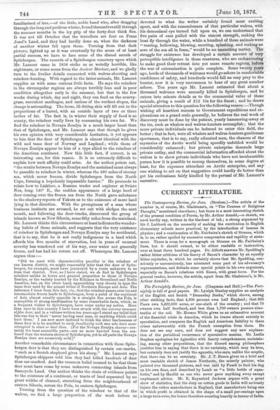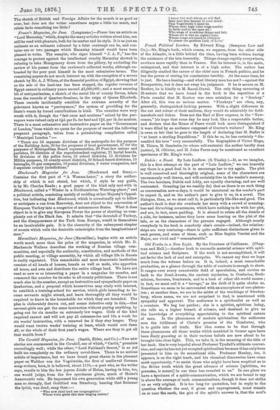The Fortnightly Review, for June. (Chapman and Hall.) — The Fort- nightly
is full of good papers. Mr. Lyulph Stanley supplies an analysis of the English and Scotch "Domesday Books," which shows, among other striking facts, that 4,500 persons own half England ; that 333 Peers own 5,422,000 acres, or one-sixth of the country ; and that 70 owners own half Scotland, and less than 1,700 owners possess nine- tenths of the soil. Mr. Horace White gives us an exhaustive account of the financial crisis in America, which he traces almost entirely to speculation, and compares the English and American liability to these crises unfavourably with the French exemption from them. He does not see any cure, and does not suggest any new explana- tion of the periodical recurrence of speculative manias. Mr. Leslie Stephen apologises for Agnostics with hearty outspokenness, maintain- ing, among other propositions, that the discord among philosophers justifies him in saying that there is no certainty, which may be true, but certainly does not justify the agnostic, who says, unlike the sceptic, that there can be no certainty. Mr. J. T. Bunco gives us a brief and most readable sketch of James Northcote, the miserly painter, who painted two thousand pictures, and was said by Fuseli to feed his dog on his own fleas, and described by Lamb as "a little bottle of aqua- fortis," and by Hazlitt as one who never gave anything away except unpleasant advice. Mr. R. Raynsford Jackson argues with a great show of statistics, that the duty on cotton goods in India will seriously injure the cotton manufacture in England, that manufacture being ono in which profit is obtained in the shape of a small per-centage upon a large turn-over, the bonus therefore counting heavily in favour of India.
The sketch of British and Foreign Affairs for the month is as good as ever, but does not the writer sometimes argue a little too much, and relate facts something too little ?































 Previous page
Previous page